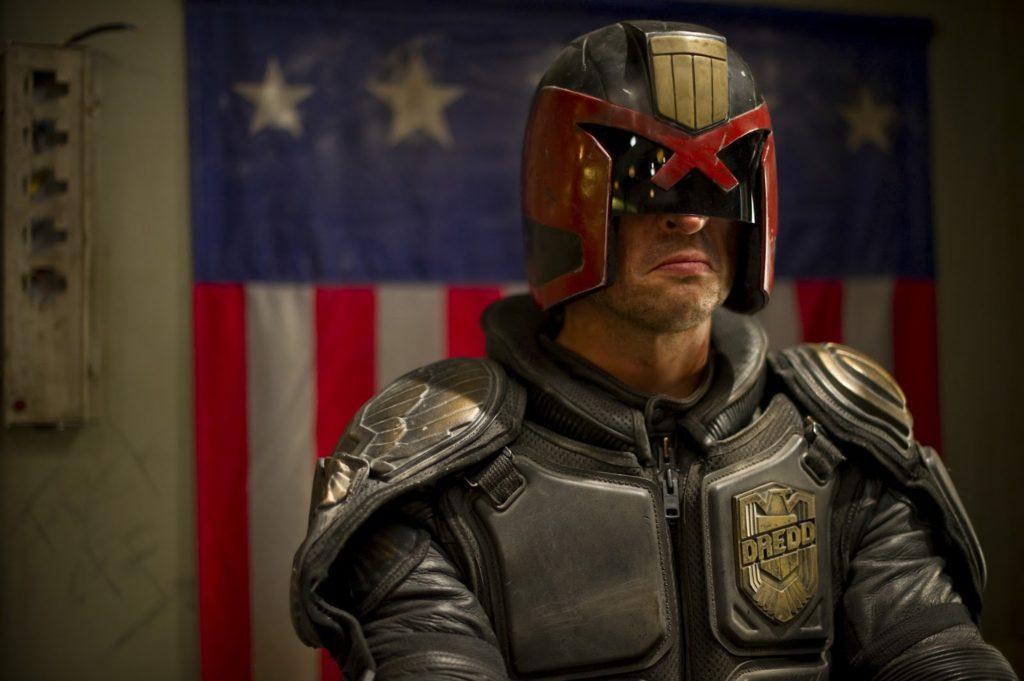The Spread looks at the social commentary and satire that made Alex Garland’s take on comic book icon Judge Dredd a searing indictment of America’s War on Drugs.

With the recent news, coming from the mouth of star Karl Urban, that screenwriter Alex Garland essentially took control of the 2012 box office disappointment/home video phenomenon Dredd, after credited director Pete Travis was locked out of post-production (confirming what had been suspected by many, and rumoured by others, for the past six years), it seems like a good time to revisit the sleeper cult hit and unearth some of the subtext that makes it a film that people love.
The most noticeable, overarching, thing that Dredd gets dead right, and so much more right than Sylvester Stallone’s silly-but-lovable iteration of the character, is that it understands that it’s meant to be satire. Judge Dredd was born out of the era of Dirty Harry and Death Wish in the US while Britain was beginning to really understand the social cost of tower blocks.
Whether or not this really was Garland’s real first film as director, as Urban now claims, the film sticks, doggedly, to the overall vision of poverty colliding with a merciless, practically fascistic, police force, creating a recipe for disaster.
On just a screenwriting level, beyond Mark Digby’s grittily realistic production design (which works), Garland understands that, whether or not Dredd understands it himself, Dredd’s job is to kill people.
In this vision of America, the police are essentially a form of population control. If they’re not handing you a mandatory sentence for anything up to, and including, vagrancy, to be served in an “iso-cube” (a prison cell which, after over forty years, have such little overall relevance to the character that they’re still not clearly defined), then they’re executing you on the spot and sending your body away to be recycled into something reusable, often food.
“You know what Mega City One is, Dredd? It’s a f***in’ meat grinder. People go in one end. Meat comes out the other. All we do is turn the handle”
That’s a lot to live with, even if you are super-rich enough to be able to guarantee that you won’t be turned into a hamburger after you get shot by either a murderous cop or a criminal desperately trying to get away from a murderous cop. You can imagine wanting to take the edge off of life in that world but strict drug laws (coffee, sugar, tobacco and alcohol are all either banned or restricted) make that quite hard.
Garland’s drug of choice in the film is Slo-Mo, an interesting choice considering that, as it’s described in the film, it has no real downside. There’s no hackneyed mentions of overdosing or addiction, as Garland himself puts it: “The idea was that, if you lived in this tough place, Slo-Mo would give you moments of beauty and peace and tranquility; you take it and your brain just starts running at a fraction of its normal speed.”
All people want is a brief escape from the horror of their reality and the price of this, because of the state’s drug and law enforcement policy, is to have immense power handed to criminal organisations, who can monopolise the production and distribution of these substances, while citizens live in fear of being caught between the crossfire of the police and the gangsters, whether they use the drug or not.
Slo-Mo is the entire inciting conflict behind the film’s story and all you find out about it is that it makes a grimy, dilapidated, hopeless environment seem momentarily nice.
The film mentions that the mandatory sentence for possession of a controlled substance is two years in the iso cubes which already creates a strong parallel to the Boggs Act, which began the mandatory sentencing laws in the United States and handed down a mandatory prison sentence for first time marijuana possession that began at two years and ranged up to ten.
Boggs was repealed in the early 70s as the so-called “War on Drugs” began, with harsher mandatory sentencing laws being implemented on a state and regional level in an attempt to combat a soaring crime rate. Mandatory sentencing in the United States has since come to be thought of by many criminal justice advocates as precisely Dredd’s job description: population control. The removal of the poorest in society, by any means necessary.

